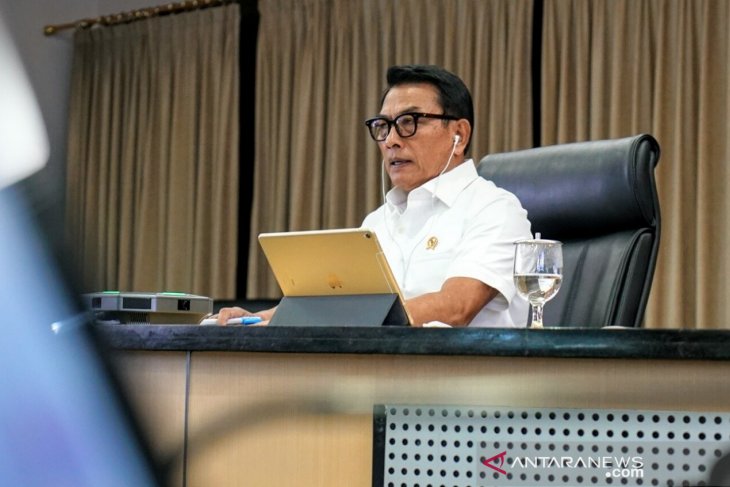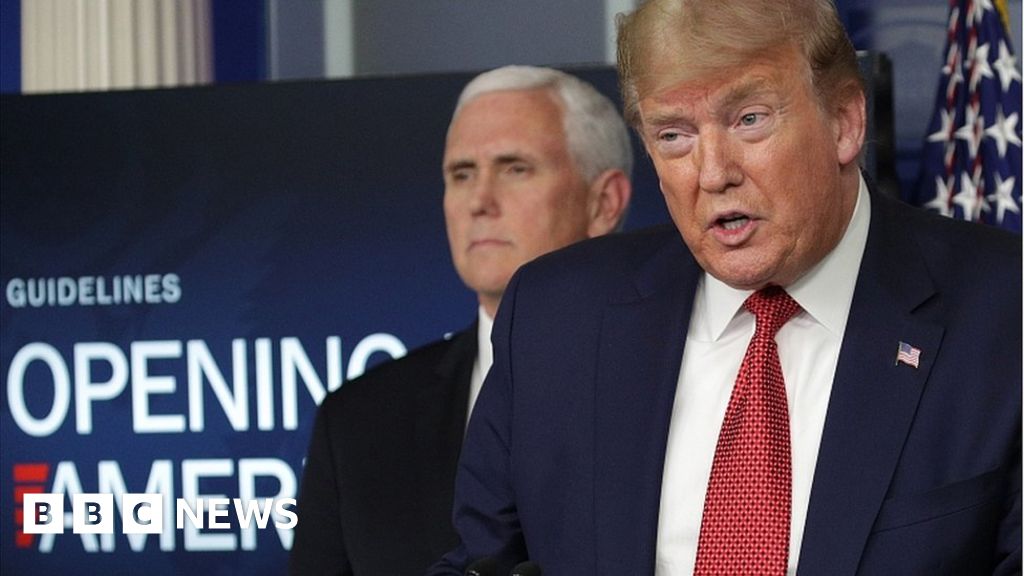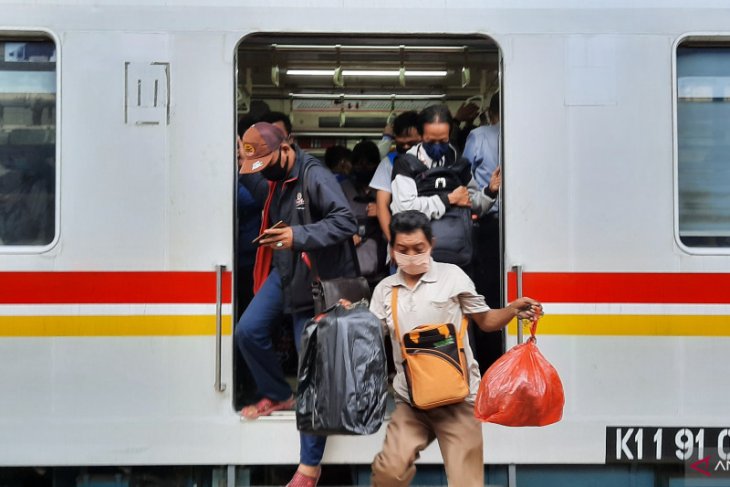Live Streaming
Program Highlight
Company Profile

Ani Hasanah
April
The guidelines for "Opening up America Again" outline three phases in which states can gradually ease their lockdowns.
Trump promised governors they would be handling the process themselves, with help from the federal government.
The US has 654,301 confirmed cases and 32,186 deaths due to the virus.
Trump has suggested some states could reopen this month.
In his daily briefing on Thursday, President Trump declared "the next front in our war - opening up America again".
"America wants to be open and Americans want to be open," he said. "A national shutdown is not a sustainable long-term solution."
He said that a prolonged lockdown risked inflicting a serious toll on public health. He warned of a "sharp rise" in drug abuse, alcohol abuse, heart disease, and other "physical and mental" problems.
Trump told reporters that healthy citizens would be able to return to work "as conditions allow". He said Americans would continue to be called upon to maintain social distancing measures and to stay home if they are unwell.
He said that reopening the US economy would be done "one careful step at a time" but he called on state governors to move "very, very quickly, depending on what they want to do".
The administration's 18-page guidance document details three phases to reopen state economies, with each phase lasting, at minimum, 14 days. They include some recommendations across all three phases including good personal hygiene and employers developing policies to enforce social distancing, testing and contact tracing.
Phase oneincludes much of the current lockdown measures such as avoiding non-essential travel and not gathering in groups. But it says large venues such as restaurants, places of worship and sports venues "can operate under strict physical distancing protocols".
If there is no evidence of a resurgence of the coronavirus, phase two allows non-essential travel to resume. The guidance says schools can reopen and bars can operate "with diminished standing-room occupancy".
Under phase three, states which are still seeing a downward trend of symptoms and cases can allow "public interactions" with physical distancing and the unrestricted staffing of worksites. Visits to care homes and hospitals can resume and bars can increase their standing room capacity.
Some regions could begin returning to normal after a month-long evaluation period, at the earliest, according to the document.
In places where there are more infections or where rates begin to rise, it could take longer.
The co-ordinator of the White House coronavirus task force, Dr Deborah Birx, told Thursday's briefing that as states worked through the three phases, they could allow for more and more employees to return to work in increments.
Phase three would be the "new normal" and would still include suggestions that vulnerable people should avoid crowded spaces. (BBC)
Jakarta (VOI News) - The Indonesian government confirms its efforts in combating the spread of the COVID-19 pandemic at home. This was said by Indonesian Foreign Minister Retno LP Marsudi in a virtual press statement on Thursday in Jakarta. She said at this time, all countries in the world were facing a health crisis that had never been experienced before. According to her, this challenge has encouraged the Indonesian government to work hard in dealing with domestic conditions in overcoming COVID-19. She stressed, there is no one size fits all countries in dealing with a pandemic. According to her, there is no guarantee that policies in one country can be applied in other countries. However, she said, every country needs to learn from other countries' experiences, best practices, and even learn from the deficiencies of other countries in dealing with the COVID-19 pandemic. In this regard, Foreign Minister Retno LP Marsudi stressed that the Indonesian government continues to increase efforts that can be made in countering the spread of the virus.
“The government of Indonesia will spare no effort to scale up, I would like to repeat, to scale up its effort to fight the virus. Every day we evaluate our policies, try to make them implementable and give more impact in our fights against the virus. This not easy of course but we will continue to do so. A multi-stakeholder, multi-sectoral, all of government, and a whole of nation approaches are pursued with maximum effort. Policies adopted by governments are always based on the relevant and unique characteristics of a country. Whether its culture, demographic condition, or economy,” Retno Marsudi said.
Meanwhile related to international cooperation in handling COVID-19, Foreign Minister Retno LP Marsudi said that it was necessary to strengthen international cooperation so that people around the world could return to normal life. Related to this, she said, Indonesia had pushed the initiative in the resolution of the UN General Assembly held virtually on April 2, 2020, which encouraged global solidarity to combat COVID-19. She said at present, Indonesia's foreign diplomacy is focusing on efforts to fight the COVID-19 pandemic while protecting both Indonesian citizens abroad and foreign nationals at home.
“Indonesia consistently wants to ensure that our containment measure in restricting the movement of people will not disrupt global trade and supply chain, including medical goods and medicines. Like other countries, Indonesia and the world, in general, are facing shortages in various medical supplies. In this connection, collaboration with other countries is not just necessary but it is a must,” Retno added.
Meanwhile, related to the protection of citizens, Foreign Minister Retno LP Marsudi said that every country must open the door for repatriation. She also stressed the importance of implementing health protocols in accordance with the World Health Organization (WHO) standards. Related to this she said that the Indonesian Ministry of Health had issued a protocol for medical evacuation, both for Indonesian people from abroad and for foreigners at home. (VOI/Ndy/AHM)
April
A Bogor-bound commuter line stops at Manggarai Station during rush hour on Wednesday (April 15, 2020). (ANTARA)
Jakarta Governor Anies Baswedan has urged ad interim Transportation Minister Luhut Binsar Pandjaitan to suspend commuter lines in and around Jakarta while the capital implements large-scale social restrictions (PSBB) to control coronavirus spread.
"Two days ago, I proposed the suspension of commuter lines to the Transportation Minister while the PSBB is in place," Anies said at a meeting with the House of Representatives' COVID-19 control supervisory team in Jakarta on Thursday.
Anies said the Transportation Ministry is deliberating on the proposal and will likely approve it after social assistance has been distributed among coronavirus affected-people.
"They are still discussing it. According to the reply I received, the operation of commuter lines will be restricted after social assistance has been distributed," he revealed.
He said the city administration has begun reducing the number of operating hours and passengers for public transport vehicles.
"The number of operating hours has been reduced and the number of passengers is also being controlled at the entrance of bus stops and stations. They (passengers) are being allowed to get onto a bus or train if there is sufficient space," he explained.
The number of passengers using TransJakarta, managed by the Jakarta administration, has dropped significantly to 91 thousand on Wednesday (April 15) from 103 thousand on April 1, he continued.
Under normal conditions, TransJakarta carries 550 thousand to one million passengers per day. (ANTARA)
April

Head of Presidential Staff Moeldoko led the Coordination Meeting of the Domestic Ventilator Production Plan through a videoconference from the Bina Graha Building, Presidential Palace, Jakarta, Wednesday (15/4) (KSP Documentation)
Three state-owned domestic companies voiced readiness to produce thousands of ventilators deemed necessary for patients exposed to a new type of coronavirus or COVID-19.
Head of Presidential Staff Moeldoko noted in a written statement in Jakarta on Wednesday that PT Len Industri, PT Pindad, and PT Dirgantara Indonesia (PTDI) were the strategic industries.
It also aligns with President Joko Widodo's instructions to optimize domestic resources in handling the COVID-19 pandemic. The head of state has also instructed to augment the use of raw material components from within the country.
"The opportunity to produce ventilators in the country aims to meet the requirement of breathing aids for COVID-19 patients," Moeldoko affirmed.
Moeldoko has also invited all industries to apply the president’s directive so that the domestic industry can more optimally handle the COVID-19 pandemic.
"I am proud because several parties, both companies, and universities, have come up with initiatives on ventilator production," he pointed out.
President Director of PTDI Elfien Goentoro claimed that his side was able to produce one thousand ventilators in a week. PTDI has collaborated with the Bandung Institute of Technology (ITB) and the Surabaya Institute of Technology (ITS) as an innovator in manufacturing ventilators.
"We have ensured that the prototype cleared the test from the Health Facilities Safety Center (BPFK)," he stated.
President Director of PT Len Zakky Gamal is eyeing a daily ventilator production of up to 50 by May 2020.
"We expect the support of KSP (Presidential Staff Office) to accelerate development in the issuance of this production permit and ventilator distribution permit," Gamal stated.
Currently, PT Len is preparing to mass-produce ventilators that have passed the Health Facilities Safety Agency (BPFK) test. Furthermore, PT Len is readying a prototype industrial design developed with the Technology Assessment and Application Agency (BPPT).
Pindad President Director Abraham Mose is targeting to produce 40 ventilators on a daily basis, with the use of local products.
"This is designed to serve as an alternative solution to the lack of ventilator devices in hospitals. The component vendor comes from Pindad itself temporarily," Mose noted.
In the meantime, Director of Pharmacy and Medical Devices Supervisor of the Ministry of Health Sodikin Sadek stated that currently, 18 research teams from ITS, ITB, and UGM were there specifically for ventilators as well as from LIPI and companies producing medical devices.
Presently, the BPFK, in charge of licensing medical devices, is assisting several universities and companies in the ventilator production process. (ANTARA)




